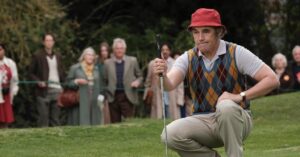The Phantom of the Open
Posted on June 9, 2022 at 5:45 pm
B| Lowest Recommended Age: | High School |
| MPAA Rating: | Rated PG-13 for some strong language and smoking |
| Profanity: | Very strong language |
| Alcohol/ Drugs: | Alcohol |
| Violence/ Scariness: | Tense confrontations |
| Diversity Issues: | Class issues are a theme in the movie |
| Date Released to Theaters: | June 3, 2022 |
| Date Released to DVD: | August 30, 2022 |

Mark Rylance, who also co-produced, pays Maurice, who was born in a small town where everyone works in the shipyard. During WWII he was evacuated to Scotland, where for the first time he saw other possibilities and was encouraged to discover and pursue his own dreams. He ended up back home and working at the shipyard, though. And he fell in love with a secretary there (Sally Hawkins as Jean), a single mother. They had twins and then everything pretty much stayed the same as the three boys grew up.
And then the political and economic changes led to “redundancies” (lay-offs) and for the first time Maurice had a chance to think about what dreams he might have. That was so far from his experience he first had to ask Jean to think of some. But then, one night, watching his first-ever television, he saw a golf match and a dream was born.
The British Open, as its name suggests, did not require any particular level of achievement or qualification, but the people who ran it just assumed that only world-class golfers would try to participate. Maurice avoided having to disclose his handicap (he had no idea what that was) by self-certifying as a professional, and that was all it took. And so, he found himself competing as the astonished onlookers, including the other golfers and the television audience, saw him, well, let’s just say the record he set was not for the lowest score.
This is a part made for Rylance, who is ideally suited to a character who may not be as naive as he appears. Director Craig Roberts gives the story a fairy tale quality, seeing Maurice as an innocent wandering through the big bad world and outsmarting those who live by traditional notions of class, power, and achievement, all to the bright and bouncy soundtrack of 70’s hits. Maurice is deferential and courteous but he is also unstoppable. Some people call his Quixotic efforts to play in the Open pranks or hoaxes. This movie comes down on the side of considering him a lovable eccentric. And it delivers with a heartwarming conclusion that — especially if you don’t follow the movie with a further investigation into the facts — might inspire you to dream a little bigger yourself.
Parents should know that this movie has some strong language, smoking and drinking.
Family discussion: Why do some people think of Maurice as a “legend?” Why was that his dream?
If you like this, try: “Eddie the Eagle” and clips of the real Maurice on YouTube
